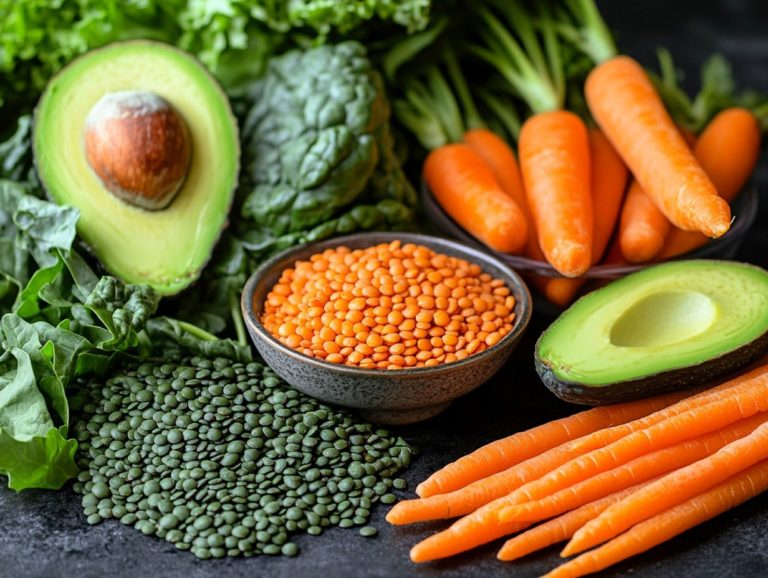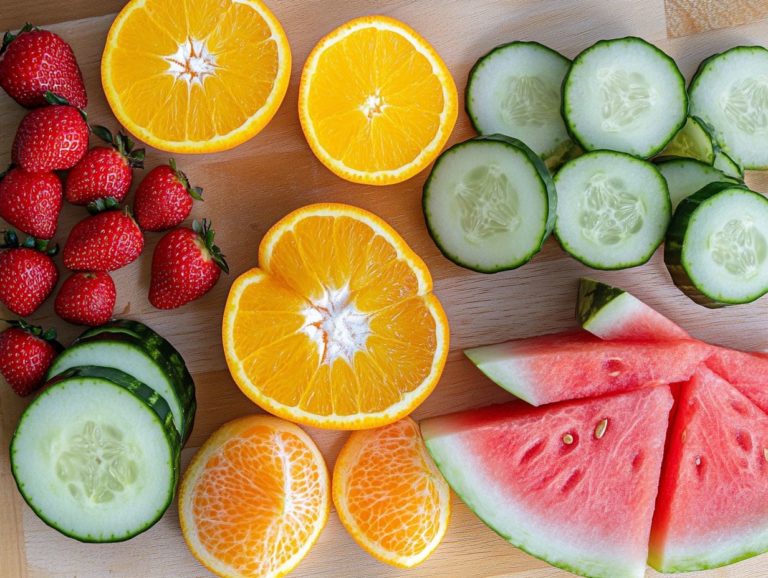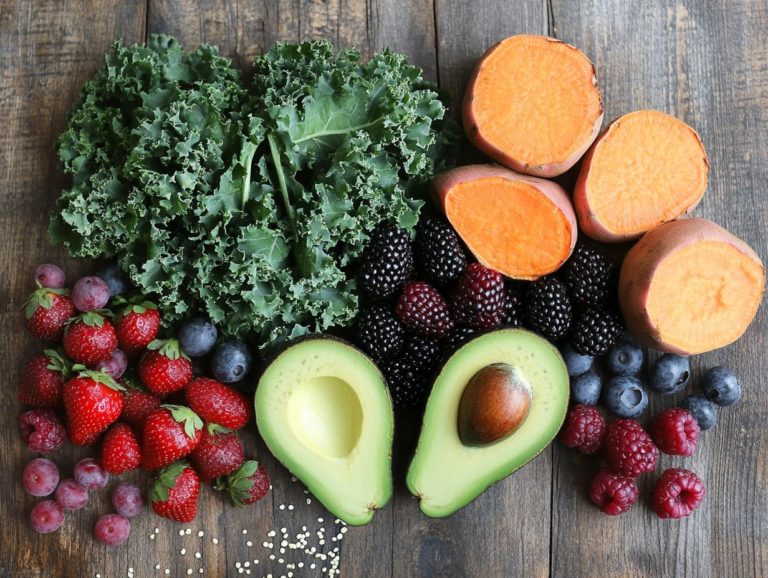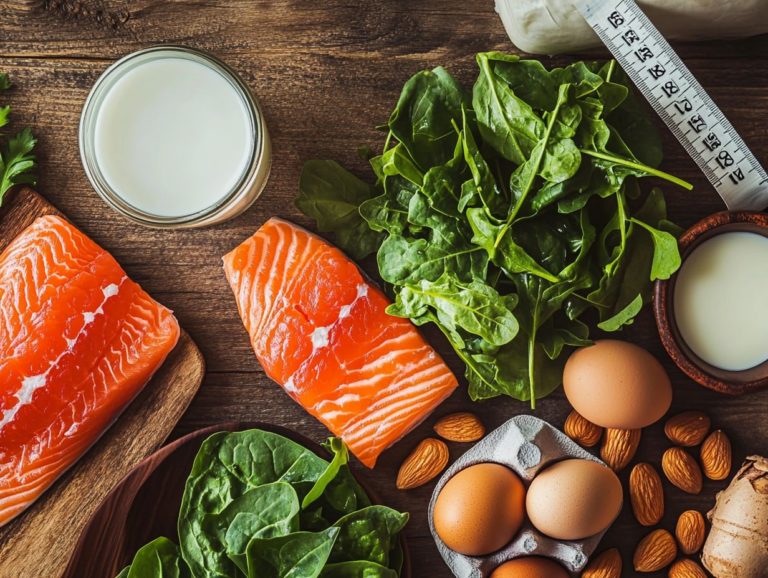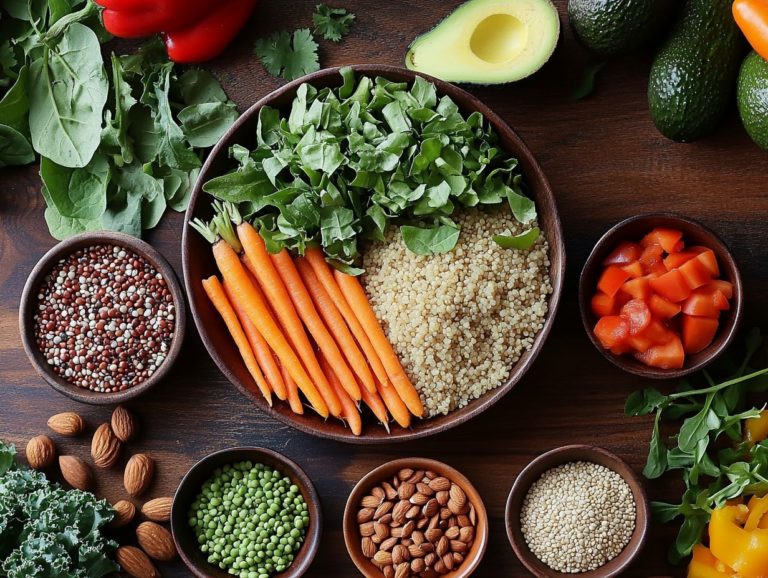5 Essential Vitamins and Their Best Food Sources
Vitamins are essential for maintaining your health, impacting everything from your energy levels to the condition of your skin.
This article delves into five crucial vitamins: A, B, C, D, and E. Each of these plays a vital role in specific bodily functions, such as vision, immunity, and bone health.
You’ll also learn how to identify signs of vitamin deficiencies, discover the best food sources for each vitamin, and get practical tips on adding these nutrient-rich foods to your daily diet.
By understanding the significance of vitamins, you can empower yourself to make healthier choices that enhance your overall well-being.
Contents
- Key Takeaways:
- 1. Vitamin A: Promotes Good Vision and Healthy Skin
- 2. Vitamin B: Supports Energy Production and Brain Function
- 3. Vitamin C: Boosts Immunity and Collagen Production
- 4. Vitamin D: Essential for Bone Health and Calcium Absorption
- 5. Vitamin E: Antioxidant and Important for Cell Function
- What Are Vitamins and Why Are They Important?
- Frequently Asked Questions
- What are the 5 essential vitamins and their best food sources?
- Why are these vitamins essential for our health?
- Can we get all of these vitamins from our diet alone?
- What happens if we have a deficiency in these vitamins?
- Are there any risks of consuming too much of these vitamins?
- What are some other sources of these essential vitamins?
Key Takeaways:
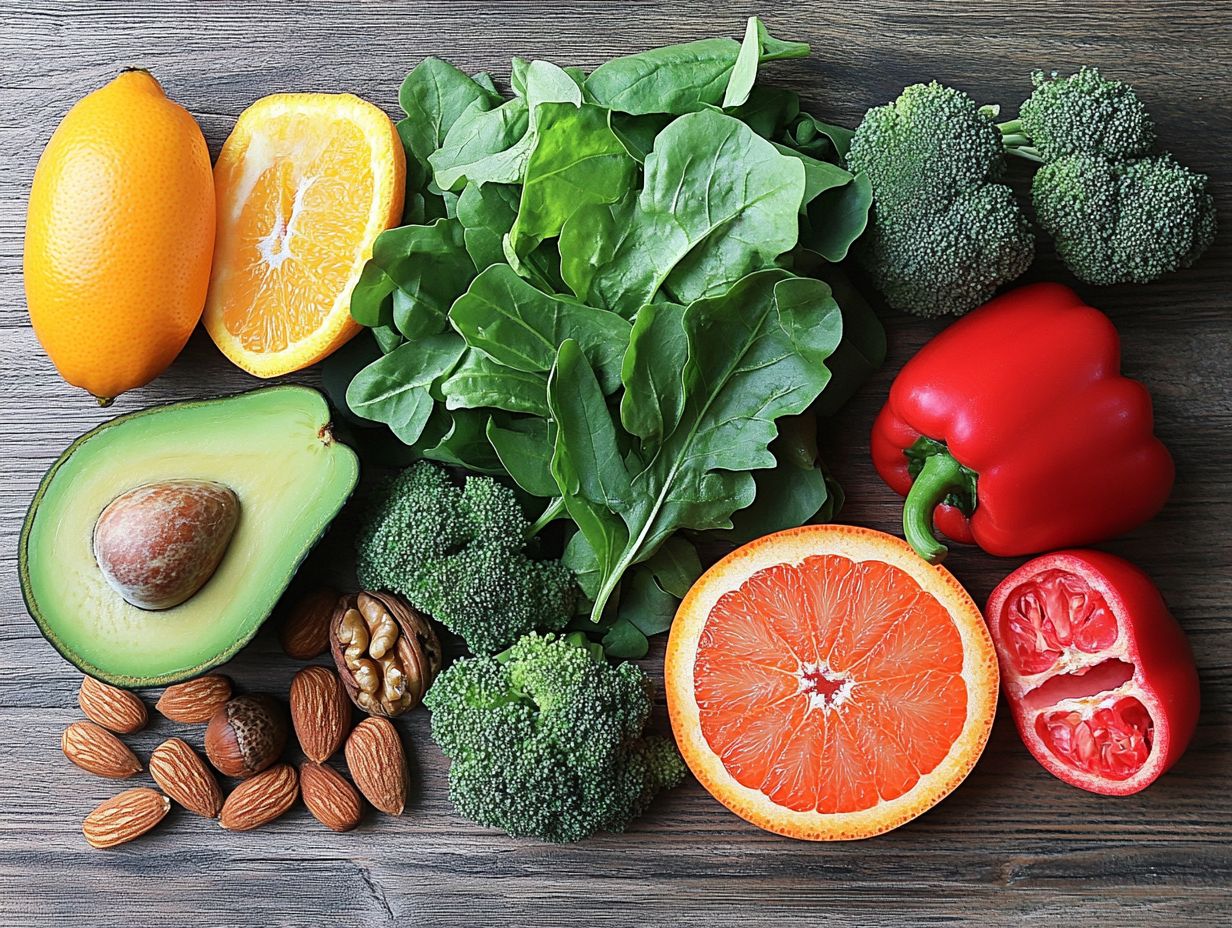
Vitamin A supports healthy vision and skin. Best food sources include sweet potatoes, carrots, and spinach.
Vitamin B helps with energy and brain function. Foods like whole grains, nuts, and leafy greens are great sources.
Vitamin C boosts immunity and collagen production. Citrus fruits, bell peppers, and broccoli are rich in this vitamin.
1. Vitamin A: Promotes Good Vision and Healthy Skin
Vitamin A is an essential nutrient that plays a pivotal role in promoting good vision and maintaining healthy skin. You can derive this vital vitamin from various food sources, including leafy greens, animal products, and fortified options. Adding these foods to your meals is important for preventing nutrient deficiencies and ensuring your body functions at its best.
This remarkable vitamin not only helps your retina perform optimally but also supports the health of your cornea, reducing the risk of night blindness and other visual impairments. Vitamin A also keeps your skin healthy by promoting cell production and repair, keeping your skin supple and radiant.
Nutrient-dense choices like carrots, sweet potatoes, and spinach are perfect for enhancing your intake. Maintaining a balanced diet rich in these foods is essential.
Without adequate Vitamin A, you could face detrimental effects, including compromised immunity and skin issues. This highlights the importance of including a diverse range of sources in your daily meals to support your overall health and well-being.
2. Vitamin B: Supports Energy Production and Brain Function
Vitamin B is a vital complex of essential nutrients that supports your energy production and brain function. You can easily find vitamin B in many tasty foods, including whole grains, legumes, and animal products, making it crucial for maintaining your overall health and well-being.
This impressive group of vitamins encompasses B1 (thiamine), B2 (riboflavin), B3 (niacin), B5 (pantothenic acid), B6 (pyridoxine), B7 (biotin), B9 (folate), and B12 (cobalamin), with each playing a unique role in your body. For instance, B1 is critical for converting carbohydrates into energy, while B12 is essential for red blood cell production and neurological health.
To get enough Vitamin B, enjoy a variety of these foods:
- Fortified cereals
- Leafy greens
- Nuts
- Seeds
- Meat
- Dairy
A balanced diet rich in these nutrients not only boosts your energy metabolism but also enhances cognitive function, making it essential for your overall vitality.
3. Vitamin C: Boosts Immunity and Collagen Production
Vitamin C is a remarkable antioxidant that boosts your immunity and plays a vital role in collagen production, which helps keep your skin firm and youthful. You can find it in abundance in plant foods like citrus fruits, strawberries, and leafy greens.
This vitamin is instrumental in enhancing your body’s defense mechanisms, helping you fend off infections and potentially shorten the duration of illnesses. Beyond its immune-boosting benefits, Vitamin C significantly contributes to skin regeneration by supporting collagen synthesis, which is crucial for maintaining skin elasticity and facilitating repair.
For many individuals, especially those with limited access to fresh produce, obtaining sufficient amounts of this nutrient can be a challenge. In such cases, dietary supplements can be a practical solution to prevent deficiencies, ensuring you receive the recommended daily intake to support your overall health and achieve vibrant skin.
4. Vitamin D: Essential for Bone Health and Calcium Absorption
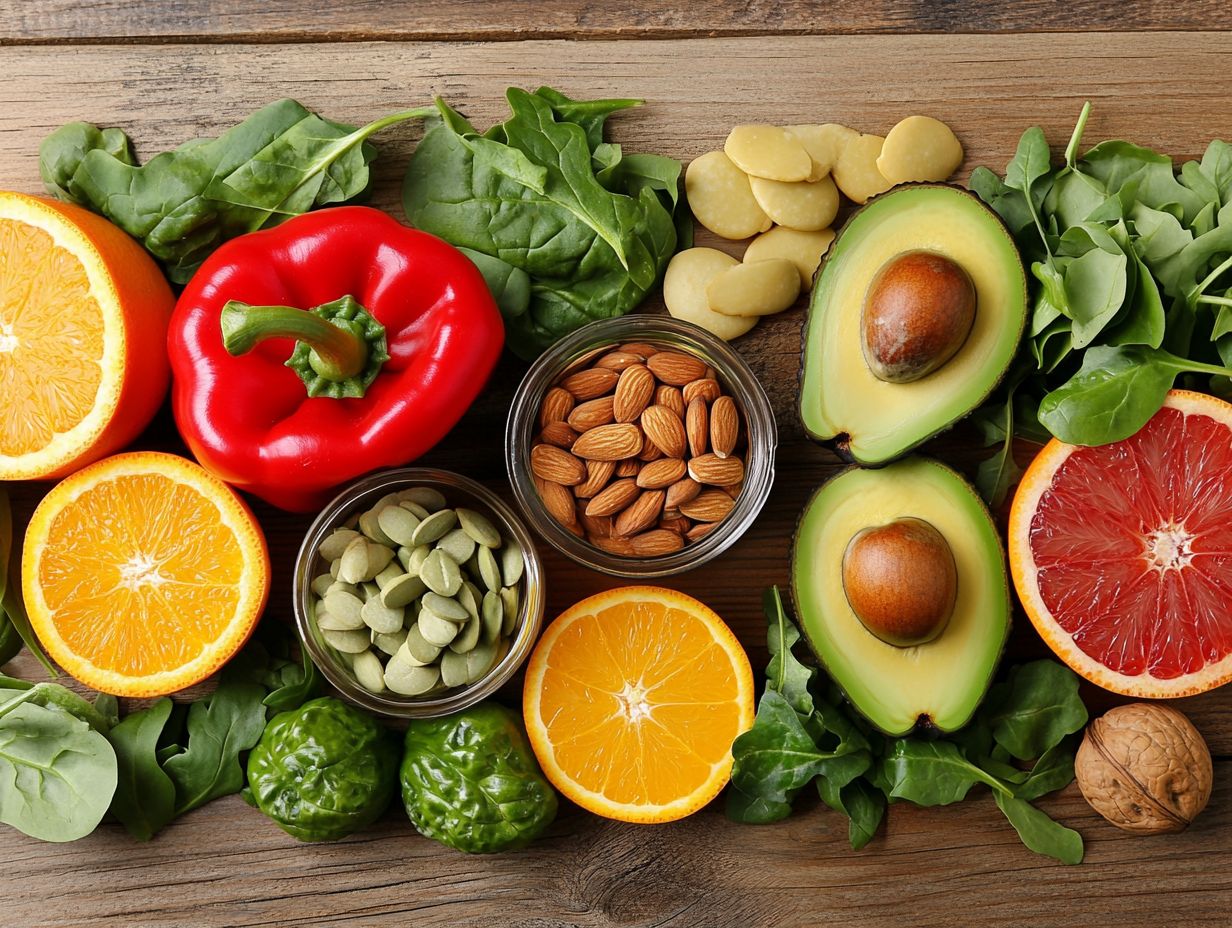
Vitamin D is crucial for maintaining bone health and helping calcium absorption. You primarily obtain it through sunlight and certain foods, like fatty fish and fortified products.
This important nutrient not only strengthens your bones but also supports your overall health. It plays a key role in immune function and reduces inflammation.
Your body synthesizes vitamin D when your skin is exposed to the sun’s ultraviolet rays. This makes it a unique nutrient that heavily depends on your lifestyle and geographic location.
If you re not getting enough sunlight, dietary sources such as egg yolks, mushrooms, and fortified milk can help fill that gap. Not getting enough vitamin D can lead to serious issues, including weakened bones and an increased risk of fractures.
Maintaining adequate vitamin D levels is crucial for your health.
5. Vitamin E: Antioxidant and Important for Cell Function
Vitamin E is an essential antioxidant that protects your cells and supports your overall health. You can find it in foods like nuts, seeds, and vegetable oils.
This powerful nutrient helps neutralize free radicals, which can cause cellular damage and speed up aging. By including vitamin E in your diet, you boost your immune function and enhance your skin health.
Foods like almonds, spinach, and avocados are particularly rich in this vital vitamin. You can easily add them to your salads, smoothies, or snacks.
Prioritizing these sources ensures a balanced diet that promotes your overall well-being.
What Are Vitamins and Why Are They Important?
Vitamins are essential organic compounds that play a key role in maintaining various bodily functions. They are vital for growth, metabolism, and immune health.
These important substances contribute to many processes, including red blood cell formation and hormone synthesis. They support numerous physiological functions.
When your vitamin intake is inadequate, you may experience serious health issues like weakened immunity and fatigue. Knowing how essential these nutrients are, make sure to enjoy a diverse and nutrient-rich diet every day!
Understanding the role of vitamins helps you make informed decisions that promote long-lasting well-being.
What Are the Different Types of Vitamins?
Vitamins fall into two main categories: water-soluble vitamins, which include the B vitamins and vitamin C, and fat-soluble vitamins, represented by vitamins A, D, E, and K. Each category has distinct functions and requires different food sources.
Understanding the various roles these vitamins play can enhance your nutritional choices. For example, water-soluble vitamins are essential for energy production and immune function, while fat-soluble vitamins are vital for vision and bone health.
A well-balanced diet rich in fruits, vegetables, whole grains, dairy, and healthy fats ensures both types of vitamins are present. By incorporating diverse foods into your meals, you can support your health and reduce the risk of deficiencies.
How Can a Person Determine If They Are Deficient in Vitamins?
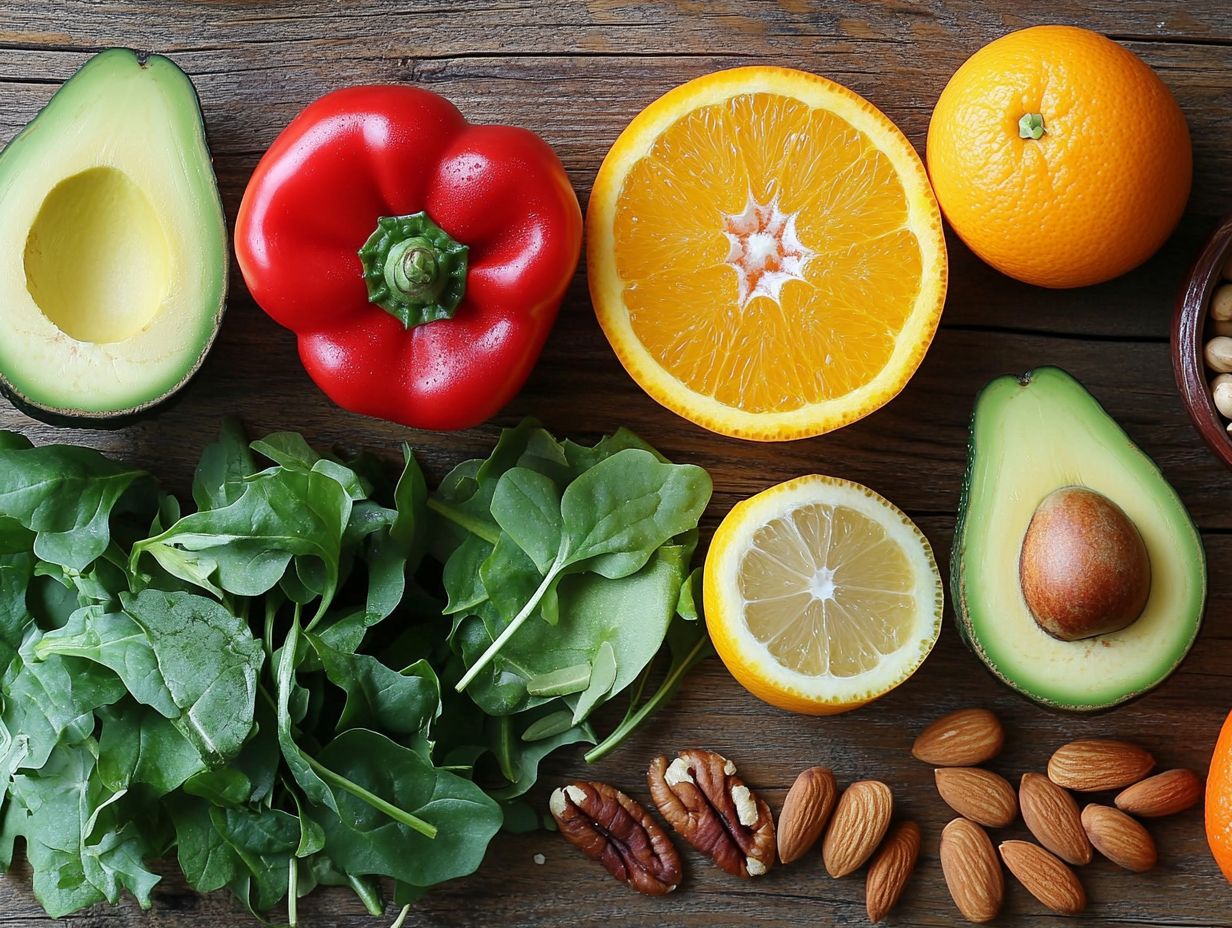
Determining if you re lacking in vitamins often involves recognizing symptoms like fatigue, skin issues, or a weakened immune system. It s a great idea to see a healthcare expert for advice! They may suggest dietary changes or supplements to tackle specific deficiencies.
These symptoms can greatly affect your quality of life. Don t wait! Recognizing these signs early can dramatically improve your life. Consulting with healthcare professionals for accurate diagnoses and tailored treatment plans is crucial.
A balanced diet, filled with fruits, vegetables, whole grains, and lean proteins, is essential for maintaining optimal health and preventing deficiencies. Incorporating a variety of healthy foods will help ensure that you regularly consume the essential vitamins you need.
Regular check-ups can also be very useful in monitoring your nutrient levels. Adjusting your dietary habits to meet your individual health needs contributes to enhanced well-being and increased energy levels.
What Are the Best Food Sources for Each Vitamin?
The best food sources for vitamins vary depending on the type. Leafy greens, fruits, nuts, and animal products offer a wealth of essential nutrients. Fortified foods also present convenient options for those striving to meet their dietary requirements.
To organize these foods effectively, it s beneficial to distinguish between water-soluble and fat-soluble vitamins. Water-soluble vitamins dissolve in water and need to be consumed regularly, while fat-soluble vitamins are stored in the body’s fatty tissues.
Water-soluble vitamins, such as B-complex and C, can be found in foods like citrus fruits, whole grains, and legumes. These ingredients work perfectly in smoothies, salads, or stir-fries, adding a delightful nutrient boost.
Conversely, fat-soluble vitamins A, D, E, and K are found in avocados, nuts, and dairy products. These can be easily incorporated into omelets, roasted vegetables, or even as delicious toppings for whole grain toast.
By weaving a variety of these foods into your everyday meals, you can create a well-rounded diet that is packed with essential vitamins.
How Can One Incorporate These Foods into Their Diet?
Incorporating vitamin-rich foods into your diet can be achieved through healthy eating practices like reading food labels, meal planning, and choosing a balanced diet that highlights fresh produce, whole grains, and lean proteins.
When navigating food labels, remember to look beyond the calorie count. Focus on the ingredient list, opting for items that include whole ingredients packed with essential nutrients.
Designing a meal plan that encompasses various food groups fruits, vegetables, grains, proteins, and dairy ensures a diverse intake of vitamins and minerals. This supports your overall health while keeping your meals interesting and satisfying, making it easier to stick to healthy eating trends.
Planning your meals ahead of time saves you precious hours and encourages mindful eating. This ultimately boosts your well-being and energy levels throughout the day.
What Are the Possible Side Effects of Vitamin Deficiency?
Vitamin deficiencies can lead to various unpleasant side effects, such as compromised immune health, muscle weakness, and skin issues. This highlights the importance of maintaining adequate levels of essential nutrients through a balanced diet and, when necessary, supplements.
Recognizing these symptoms early is essential, as they can significantly affect your overall well-being and quality of life. For example, a deficiency in vitamin D often manifests as fatigue and bone pain, while a lack of vitamin B12 can cause neurological issues like numbness and tingling.
To combat these deficiencies, consider incorporating foods rich in these vitamins into your meals, such as:
- Fatty fish for vitamin D
- Fortified cereals for B12
Consider exploring high-quality supplements, especially if you have a restricted diet or specific health concerns. Your health is worth the investment.
Frequently Asked Questions
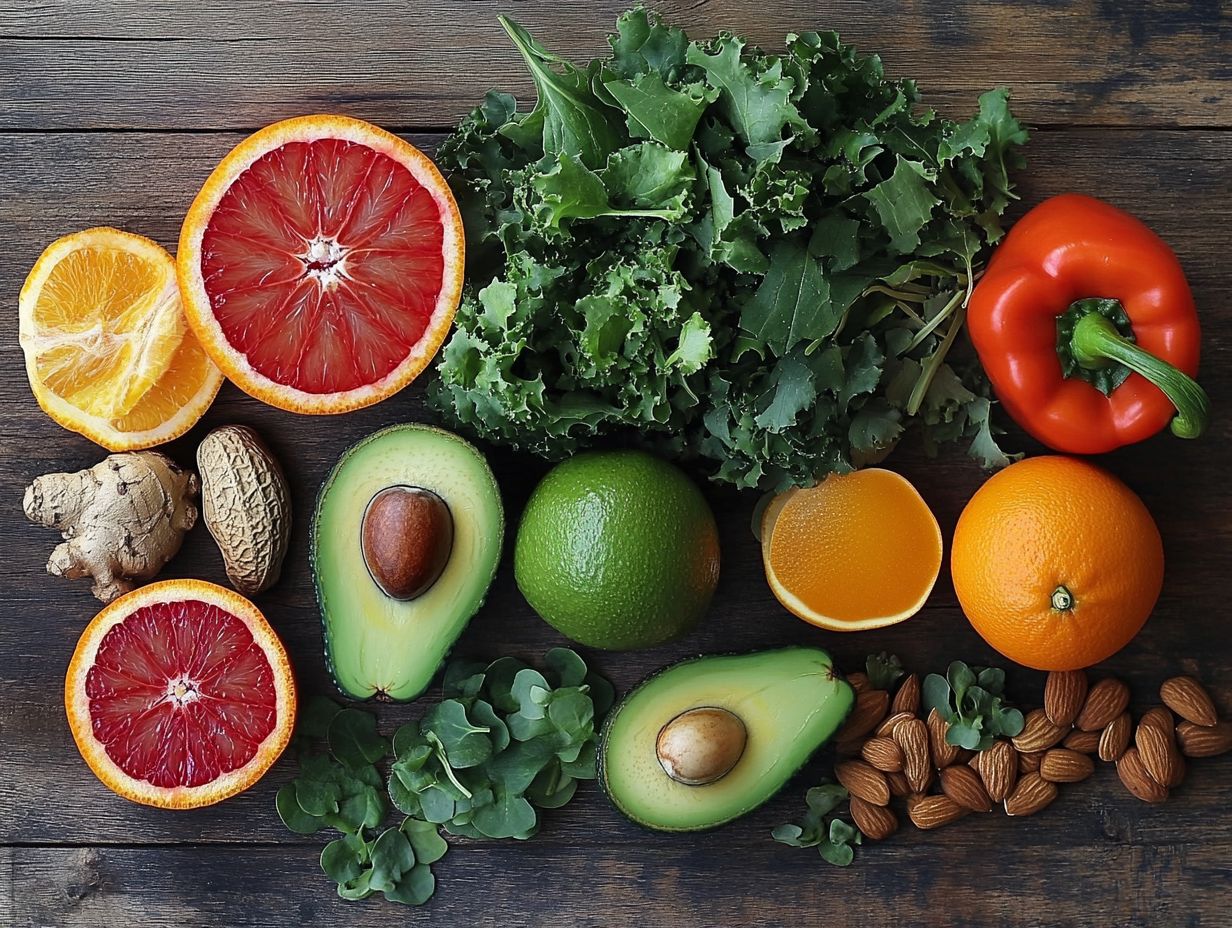
What are the 5 essential vitamins and their best food sources?
The 5 essential vitamins in dietary guidelines include Vitamin A, Vitamin B1 (thiamine), Vitamin C, Vitamin D, and Vitamin E. You can find Vitamin A in carrots and sweet potatoes, while whole grains and legumes are great sources of Vitamin B1.
Citrus fruits and leafy greens provide Vitamin C. Fatty fish and dairy products are rich in Vitamin D, and nuts and seeds are excellent sources of Vitamin E.
Why are these vitamins essential for our health?
Vitamins are small nutrients our body needs to function well. They help with metabolism, support the immune system, and boost energy production.
Without these vitamins, you might face health problems due to deficiencies.
Can we get all of these vitamins from our diet alone?
Yes, a well-balanced diet can provide all these essential vitamins. However, you may need to get Vitamin D from sun exposure or fortified foods to meet daily requirements.
What happens if we have a deficiency in these vitamins?
A deficiency can lead to serious health issues. For instance, not getting enough Vitamin A can cause vision problems, and a lack of Vitamin C can lead to scurvy.
Ensuring you get enough of these vitamins is crucial for maintaining good health.
Are there any risks of consuming too much of these vitamins?
Yes, consuming too much of certain vitamins can harm your health. Excess Vitamin A can damage the liver, while too much Vitamin D can cause calcium buildup in the blood.
Always follow recommended intake levels and consult a healthcare professional before taking supplements.
What are some other sources of these essential vitamins?
Besides the top food sources, you can find these vitamins in many other foods. For example, Vitamin A is also present in spinach and eggs.
Vitamin B1 can be found in pork and sunflower seeds, while bell peppers and strawberries are good sources of Vitamin C.
Fortified cereals and tofu provide Vitamin D, and avocados and leafy greens are great for Vitamin E.


